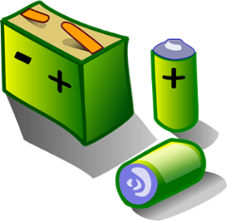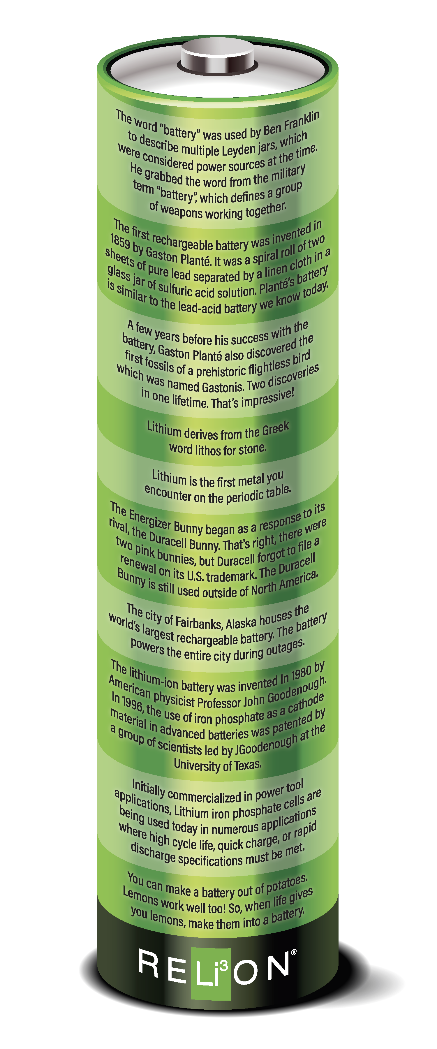Batteries can be found in virtually every household item – remote controls, phones, smoke alarms and toys. They even help us power important equipment like our cars, boats, lawn mowers and more.

Observed each year on February 18th, National Battery Day is a day to appreciate the convenience batteries provide to our everyday lives. While it is not an observed national holiday, it is a significant day for RELiON Battery because it’s the birthday of the Italian physicist, Alessandro Volta. Benjamin Franklin coined the term “battery”, but the version we know today was created by Volta. Today, we at RELiON commemorate his birth, and the importance of the modern day battery.
Many years have passed since Volta developed the first battery, referred to as the “voltaic pile” back in 1800, but his invention progressed the scientific world into a whole new level of technologies. In fact, in recognition of Volta’s contribution to technology, the unit of electric potential is called the “volt”.
Can you imagine a world without batteries?
Think about it, just about everything we use in today’s world runs on a battery! In modern society, portable power isn’t something we think about every day because it's easily accessible. Where would we be without the humble battery? Take a moment to consider how many of your household items use batteries – from cars to remote controls and hand-held devices. Battery Day is all about celebrating and recognizing just how important the simple battery is to our way of life.
Here are 10 electrifying facts about batteries:
- The word “battery” was used by Ben Franklin to describe multiple Leyden jars, which were considered power sources at the time. He grabbed the word from the military term
 “battery”, which defines a group of weapons working together.
“battery”, which defines a group of weapons working together. - The first rechargeable battery was invented in 1859 by Gaston Planté. It was a spiral roll of two sheets of pure lead separated by a linen cloth in a glass jar of sulfuric acid solution. Planté’s battery is similar to the lead-acid battery we know today.
- A few years before his success with the battery, Gaston Planté also discovered the first fossils of a prehistoric flightless bird which was named Gastonis. Two discoveries in one lifetime. That’s impressive!
- Lithium derives from the Greek word lithos for stone.
- Lithium is the first metal you encounter on the periodic table.
- The Energizer Bunny began as a response to its rival, the Duracell Bunny. That's right, there were two pink bunnies, but Duracell forgot to file a renewal on its U.S. trademark. The Duracell Bunny is still used outside of North America.
- The city of Fairbanks, Alaska houses the world’s largest rechargeable battery. The battery powers the entire city during outages.
- The lithium-ion battery was invented In 1980 by American physicist Professor John Goodenough. In 1996, the use of iron phosphate as a cathode material in advanced batteries was patented by a group of scientists led by Goodenough at the University of Texas.
- Initially commercialized in power tool applications, Lithium iron phosphate cells are being used today in numerous applications where high cycle life, quick charge, or rapid discharge specifications must be met.
- You can make a battery out of potatoes. Lemons work well too! So, when life gives you lemons, make them into a battery.
At RELiON, we thank Volta for being a true innovator. His invention set the world on a new path. He's an inspiration to our company as we continue paving the way for new energy storage solutions.
So, today, pay homage to the power source that’s at the root of how our lives function. Without these little power cells, you wouldn’t have the voltage necessary to do many things, like turn on your television or go on that weekend excursion in your RV. To help you really appreciate batteries, try going a whole day without using one. Maybe try it tomorrow, since if you're reading this on your computer or cell phone, it might be too late! Happy National Battery Day!